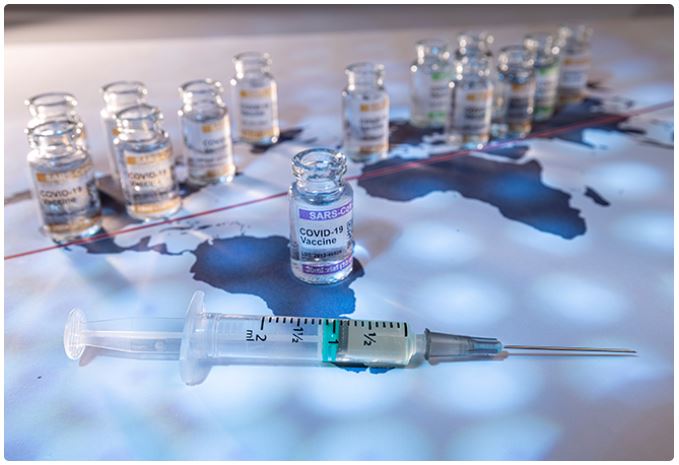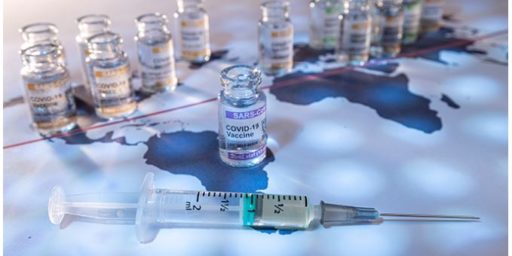Vaccine Patent Rights
Should live-saving drugs be protected intellectual property?

Wednesday, the Biden administration threw its support behind efforts to waive intellectual property protections for COVID vaccines, citing the urgency of getting people in the developing world vaccinated. Yesterday, German chancellor Angela Merkel announced her opposition, declaring that “The protection of intellectual property is a source of innovation and it must remain so in the future” and that, anyway, “production capacities and the high-quality standards, not the patents” are the main obstacles to distribution.
Not surprisingly, the WSJ Editorial Board is on Merkel’s side on this one, calling Biden’s idea “theft” in its headline, “steal[ing]” in its subhed, and a “heist” in its lede.
President Biden genuflected again to progressives on Wednesday by endorsing an intellectual property waiver at the World Trade Organization for Covid vaccines and therapies. This patent heist won’t end well for the U.S. or the world.
[…]
WTO rules already allow low-income countries to force drug makers to license their patents during emergencies, though they must negotiate some agreements with developers. Liberals says this is slowing vaccine production.
Yet U.S. and European drug companies have already voluntarily entered into dozens of licensing agreements with other manufacturers, many in low-income countries, as they work to scale up production. Merck last week announced licensing agreements with several Indian manufacturers to produce its investigational antiviral drug.
But vaccine and drug makers first need to ensure their partners can safely manufacture the complex biologic products. This takes time. So does ramping up production of raw ingredients. Even so, global vaccine production is accelerating. The U.S. has also committed $4 billion to Covax, a World Health Organization initiative, which aims to distribute two billion doses to lower- and middle-income countries by the end of this year. Yet India, a global vaccine production powerhouse, recently restricted exports to serve its own population.
European governments have opposed the waiver because they realize it sets a terrible precedent. Once stolen, IP on breakthrough innovations like Moderna and Pfizer -BioNTech mRNA vaccines can’t be returned. So why did Mr. Biden surrender?
Progressives are pounding the White House for supposedly hoarding vaccine doses, though only a few months ago it was praised for ordering more supply from Pfizer and Moderna. The White House recently agreed to release 60 million of its contracted AstraZeneca doses, but only after they receive FDA approval. Contracts with other manufacturers limit exports to countries without liability protection for potential adverse side effects.
The Administration’s WTO waiver will break patents and legal protections for vaccine makers. Investors will be less likely to fund new drug research if they think their own government will betray them under political pressure. Chalk up another damaging victory for the Congressional left.
Dave Schuler, who pointed me to the WSJ editorial, pushes back a bit:
I think that U. S. intellectual property protections are too robust. Patents are not part of the natural order of things. They are government-granted monopolies. There’s a reason that so many developments are patented in the U. S. and it’s not just that we do so much R&D.
Still, he wonders if following through on Biden’s idea would constitute a “taking” under US law.
Kevin Drum, meanwhile, argues persuasively that Biden’s announcement is really just a smokescreen.
As near as I can tell, this is something of a meaningless gesture. Many of the patents involved in manufacturing the vaccines don’t belong to Pfizer/Moderna/etc. in the first place. They’re licensed from various other sources. Nor are patents really the biggest stumbling block for poor countries that want quicker access to vaccines. It’s manufacturing know-how and shortage of raw materials. And anyway, these countries already have legal remedies available that allow them to force pharmaceutical companies to license generic versions of their drugs at low cost.
His suggestion lines up with what I’ve been arguing for a while now:
Beyond this, if the US really wants to make vaccines more available to poor countries, the solution is easy: spend lots of money. How much would it cost to purchase, say, 10 billion doses of vaccine? $50 billion? $100 billion? This is not a huge sum of money by American standards. And it would be even less if we split the cost with Europe. This is more or less the goal of Covax, the global initiative aimed at equitable access to COVID-19 vaccines, which has so far been a dismal failure.
At the risk of sounding a little too cynical, I think Biden’s patent announcement represents something of a bad habit. He’s done a lot of things to appease the progressive wing of the Democratic Party, but many of those things are more symbolic than real. Sometimes that’s because they’re unlikely to ever become law; sometimes it’s because they simply don’t have a big effect; and other times it’s because he can give in at a pretty low cost.
Politically, this is a savvy strategy, and it often has no real downside. But this time it might. The real answer to global vaccine coverage is money, and lots of handwaving about patents does nothing but obscure that.
The caveat I would offer is this: to the extent the vaccines are developed using government funding or backing, the taxpayer should certainly have some stake in the IP. That is, if Moderna’s vaccine is largely a result of CDC grant money, we should certainly have the right to buy it at a lower price than if the company took the risk of developing it out of hide. Relatedly, given that Operation Warp Speed both helped speed up production and backstopped failed attempts, we’re entitled to a discount.






I think Moderna, maybe Pfizer too, had already said other countries could go ahead and use their methods but no one has. There is not just a lack of materials and production capability but a real lack of knowledge and experience. The IP thing in this case is pretty meaningless.
A lot of money is the answer but I dont expect us to come up with what is needed. The US is always happy to spend many billions/trillions on a war, but large spending to help other countries (even if it would help us) at a time when we still have significant unemployment wont go over well. Remember that half of the country still thinks Covid is a hoax or exaggeration.
Steve
In response to steve’s observation above, if vaccines were developed using government funding, are the patents legitimate? But I’m skeptical of steve’s claim that the issue is “knowledge and experience”. I believe that the Indian Big Pharma companies have plenty of knowledge and experience.
And I would distinguish between Moderna’s statement that they would not enforce their IP on the vaccine during the pandemic and that they’re planning to give it away.
This is a complex question, but in one sense the answer is fairly easy. Virtually all new medicines that are based on transformative science (i.e. those not merely applying fifty year old technology to tweak yet another variant of a statin drug) are based on government or institute sponsored research. Large pharmas spend very little money on groundbreaking science.
That science is developed in grants parceled out in relatively small chunks. Once the science is proved in animal models as best as it can, that’s where the pharmas take over, because human trials cost hundreds of millions or billions in one big chunk.
Here’s where the real tragedy of modern medicine development occurs. The pharmas pick their development products based on NPV or other rate-of-return calculation and the probability of success and not based on benefits to humanity. This almost always favors small incremental changes to a drug that allows them a new patent on something a patient will have to take for the rest of their lives. Blood pressure medication, cholesterol, etc. A pill that cured a specific form of cancer after one dose is going to have a poor NPV and a high risk, so it will never make it past the first selection round.
If you look back over the past half century or more, almost all real breakthroughs in medications come from researchers, usually government funded researchers, teasing out data that shows patients taking some medicine for a well established purpose are also doing better for an unrelated disease state.
Government funds a great deal of basic research through grants to individual researchers at universities. mRNA technology comes after decades of R&D in genetics, DNA, RNA, genomics, etc. So do inactive virus vectors like those used in the J&J and AstraZeneca vaccines, for instance.
IMO, asking whether the government has funded the research that led to these vaccines, is a bit like asking whether the availability of oxygen in the atmosphere allows the scientists involved to keep on breathing.
Other governments also fund research in other ways. And let’s not forget the Pfizer vaccine was developed by a German company called BioNTech
@steve:
An anecdote from a lunchtime conversation I had with one of our company’s IP attorneys back in the days when I was doing tech research.
Him: “The patent law says the patent has to reveal enough information to reproduce the invention.”
Me: “That one ‘skilled in the art’ can reproduce the invention.”
Him: “How long would it take you to reproduce <the patent we were discussing>?”
Me: “Years. A billion dollar budget.”
Him: “Why so much and so long?”
Me: “I’m not skilled in the art.”
Him: “How many people are?”
Me: “For this? I’d guess a dozen.”
Him: “Here in town?”
Me: “In the world.”
It’s almost a sure thing that there is no one person in the world who knows enough about all the biology, chemistry, and mechanical engineering that goes into producing the Pfizer/BioNTech and Moderna vaccines to reproduce it from scratch.
On a more serious note, neither Pfizer/BioNTech nor Moderna control all of the IP that goes into their vaccines. I’ve been following a couple of people who have tried to dig through published papers and various press releases to work out the supply chain and the IP ownership. P/B licenses a critical process from a Canadian company that spent years developing it for other purposes. Moderna buys a precursor chemical (also useful for other things) from a Belgian company that holds the IP. Both of them appear to buy mixing services from companies whose tech all traces back to a Swiss company. As before, the mixing is useful for far more than just these vaccines.
Question for James, then: Are you suggesting that none of these should be subject to patent, since it turns out that they are useful/necessary to produce a specific type of vaccine?
@Michael Cain:
Well, not one person could make a pencil. The vaccine seems a tad more complex.
Alex Tabarrok has been on this beat. He’s been essential reading on vaccine development and deployment.
Dave- I specified four problems, materials, lack of production capability, knowledge and experience. India has 2 out of 4.
Steve
India already has a clause in its IP laws saying basically “in an emergency, we get to ignore your Indian IP and go ahead and make a useful pharmaceutical.” Also, since IP is geographical, Moderna making noises about releasing US patent rights says nothing about what is going on in India.
(obligatory comments about PCT, 102 (a)(1), how none of this is legal advice, etc. etc. and so forth.)
@David Schuler: they have knowledge and experience in classic vaccine. However the production skills (as well as specific capital equipment) needed for mRNA are substantively different than classic at key points. It is in fact the binding constraint. And one that is indeed the current limiting factor. Naive readings of skills based on “it’s all vaccines” leads to wrong conclusions for the near-term at present.
It’s wonderful how convinced people with no IP are that laws protecting IP are unnecessary.
People will risk their lives so long as there is at least a chance of surviving. Against certain death, the volunteer pool is substantially smaller. Creation of IP is a gamble – no one gambles if the pay-off is certain to be zero.
A decade ago I was hearing that creatives would create just for the joy of creation. You know, like all the free creativity on display on YouTube. Which is now a profit center for creatives.
There is no free lunch. You want music, software, TV, movies, books and yes, pharmaceuticals? Then someone needs to get paid.
@MarkedMan:
I ask because I don’t know this but would like specifics.
How much of Moderna’s money was spent on the Coronavirus vaccine trials? (Or Other makers) as versus “inventing” and manufacturing.
@Michael Reynolds:
Absolutely. As noted in the OP, if the government is backstopping the risk and/or funding the R&D, it ought to get a discount. But, yeah, developing a vaccine that saves a few hundred million lives ought to come with a decent payout.
So, in reading the title, I realized something: property rights shouldn’t be a monolith.
By that, I mean that I agree that people who develop IPs should absolutely get paid, but they shouldn’t necessarily be allowed to have full control over the output of that property. Sometimes, even perhaps most times, they should, but it should be assessed on a case-by-case basis rather than as a catch-all.
Which, in the case of pharmaceuticals, means that you have a right to get paid, but you don’t have a right to hoard, and thus no right to control over how much you get paid for it. I think what I’d like to see is some kind of “eminent domain” clause that applies to IP rights: the government has the power to buy distribution rights at a fair price (whatever that means), and then it’s the government’s role to decide what gets done with it.
I’m not remotely enough of a lawyer to understand if that’s feasible or sane, but I thought I’d throw it out there.
@Bob@youngstown: My guess? None. That’s why all those governments put cash up front or guaranteed purchases (which can be used to borrow money at very low interest rates).
I’m no expert but my impression is that these days vaccine development is considered a waste of time. Big Pharma companies make vaccines because they bought other companies that made vaccines and since no significant new investment is necessary they keep cranking them out. But they don’t typically invest in making whole new vaccines. I suspect it’s no accident that all three of the COVID-19 vaccines that I know about were actually developed by much smaller firms. The big Pharma companies just supplied the scale.
@Michael Reynolds: I agree with you 100% on the importance of IP rights and the benefits it has brought to society, but it’s worth remembering that the reason governments will go as far as imprisoning someone who violates IP laws is because it is perceived as a benefit for society as a whole. The purpose of inventing the concept of IP (a rather strange concept when you actually think about it) and putting the force of law behind wasn’t to help line the pockets of individuals, but to promote innovation and the development of a strong arts culture. The mechanism chosen results in artists and inventors making money, but that’s merely a means to the intended ends. Once it stops being beneficial to society we should do away with it. (No, I don’t think we are anywhere near, or even in sight of, such a situation.)
As I suspected, even for the flu vaccines, most of the money for innovation comes from the US government.
I tend to agree that the IP issues are a side point. These are extremely cutting edge vaccines and I’m dubious that they can be made by other companies not specifically working with Pfizer/Modern (who have already licensed other manufacturers to produce them). One of the big dangers here is that some company in Brazil starts making vaccines that don’t work, as we’re seeing with Sputnik and Sinovac.
Pfizer says they’ll have a billion doses by the end of the year. And we’re paying about $20-30 a pop. We could vaccinate the entire world for about may $150 billion. That would be peanuts to what we’ve paid economically in the last year. Get the rich countries to chip in, push this virus to the occasional breakout and I’ll learn to deal with some corporate CEO getting a mega-yacht out of it.
@MarkedMan:
First off I’d never support sending people away for copyright infringement. Imagine the expense of all those new prisons. We’d have to put a wall up around Wyoming and start cramming the state full of miscreants. No, a simple beating would suffice.
@Hal_10000:
I agree. These people pulled off a damn scientific miracle with absolutely shocking speed. They’re saving millions of lives. They are way down the list of billionaires I’d have reason to resent.
@Hal_10000:
What have you heard about Sputnik? All I was able to find out, aside from the claimed efficacy figures, was a claim in Brazil that a batch contained replicating adenovirus. This would fail to immunize anyone, and it’s terrible. But as far as I know, it’s one batch.
@Michael Reynolds:
Not that shocking speed. Moderna has been working on mRNA vaccines for years. I assume BioNTech has as well. Thus far, they’d had no vaccines approved for use in humans. This is partly because existing vaccines, like MMR or polio, are very effective and there’s a manufacturing base already.
While the mRNA vaccines seem superior in efficacy, keep in mind no less than two other developers produced a vaccine as fast using a viral vector. This, too, is recent technology.
We were lucky mRNA technology was ready when SARS-CoV-2 hit. Had it come a few years earlier, the best we might have been able to do is what AstraZeneca and J&J offer (I’ve yet to hear results from phase 3 trials of sub-unit vaccines). The “tried and true” method of using a killed/inactive virus hasn’t worked out well, either.
@Michael Reynolds:
I don’t think most people mind the creator getting paid. The question is whether the creator’s heirs deserve to be paid until the end of time off the ability to extract rents for blocking access to our common culture.
When “The Great Gatsby” became public domain on January 1st this year, the Fitzgerald family had, over the last 95 years, gotten more then enough “paid”.
@Michael Reynolds:
Corporations arent people.
Someday I’ll track down the economist who said you’d have a much better system if government simply had a panel that funded and tested new drugs. Government-funded research already funds a hell of a lot of pharmaceutical research. You wouldn’t get the billions of dollars of waste in advertising. “Ask your doctor if Xianix is right for you!” What’s it do? Helps you cavort on a beach, looks like from the ad. And you wouldn’t get the billions of dollars of trying to come up with the slightly different Cialis when Viagra was already on the market. The the government could then license out the manufacture.
@Console:
Actually I am two corporations. But I agree with you on that point. What I think you may overlook is that copyright law is all that protects creatives from corporations. I’m not worried about getting ripped off by Joe Blow, I’m worried about being ripped off by Hollywood. That’s already happening and I’m still alive.
@Stormy Dragon:
I favor re-writing copyright laws. I agree it’s absurd for copyright to extend essentially forever. But bear in mind, the beneficiaries aren’t the people, but the media corporations. You won’t be the guy picking my bones, it’ll be Disney.
@Kathy:
Shocking speed from the ‘OMFG, this thing’s gonna kill us all,’ to, ‘Oh thank God, they’ve got a shot.’
From the Great Plague of London in 1665-66, to what, the late 1940’s with antibiotics? Thirteen hundred years, give or take to get a vaccine for plague? This was fast AF.
@Michael Reynolds:
Part of that is because a lot of the companies that ended up fielding COVID19 vaccines were already working on MERS or SARS vaccines before the pandemic started and just redirected an already existing project to focus on a different coronavirus.
@Michael Reynolds:
No way to have made a vaccine for anything until fairly recently. The first vaccine wasn’t a vaccine, it was a disease, cowpox. It was mild, mostly nonlethal, and it prevented smallpox, but it wasn’t a vaccine.
At that, why didn’t anyone notice long before Jenner that people who milked cows almost never caught smallpox?
What I’m trying to get through, is that the mRNA vaccines are the culmination of decades of research in genetics and related fields, not something cooked up back in March 2020 out of the blue, like it happens in science fiction. Not to mention an even older existing infrastructure of drug manufacture, testing, and distribution.
Many things that seem fast aren’t. Take the Apollo program. We can say it’s astonishing NASA went from suborbital manned flights in 1961 to landing on the Moon in 1969. It is. But that ignores years of launching satellites on orbital flights, and the development of rockets going back to Professor Goddard’s experiments in the 1910s.
So it didn’t take 8 years to get Apollo, it took well over 50.
@Michael Reynolds:
I agree completely and I find the idea of the government being able to take away patents, copyrights, or trademarks.
Burkina Faso is not going to get into the mRNA vaccine production. The one perverse effect this could have is that AZ or J&J decide their vaccine sales are cratering and switch production to the Pfizer variant and try to underbid the competition.
@David S.: Most other countries with patent rights have laws against people hoarding their IP. There can be forced licensing if the patent doesn’t get used and one of conditions for maintenance of the patent (aside from paying yearly annuities) is filing a Statement of Use. (Depending on the country the intervals between filings differ.)
We’re one of the few countries that doesn’t officially have this (but see below). We do have maintenance fees, and you’d be surprised at the number of patents that expire at the first maintenance fee hurdle.
Quite often if the research for a U.S. patent has been paid for by the U.S. government there’s some sort of agreement that the U.S. gov’t can demand a license with rather cheap royalty payments. It’s usually a separate agreement between the U.S. gov’t and whoever’s getting the research $$. And usually since a condition of employment of a researcher is to assign over whatever patent rights he may come up with to the university/research lab it’s usually something that gets decided among the US govt., (DOE, DOD, etc.), the researcher, and the laboratory.
@grumpy realist: Sorry, I wasn’t clear: I’m not using “hoard” in any technical sense, but instead in the sense that you shouldn’t be able to withhold license for something regardless of circumstance. I.e., whoever devleoped the vaccine has a right to make a profit off the R&D that went into it, but not a right to selectively withhold the license in order to inflate its price.
That flies against the basic assumptions of property law: that the property owner has full control and can do what they like: but in specific cases, I think waiving that is warranted. (To wit, property law is frequently “violated” via search warrant. That’s why there’s a due process to obtain such a warrant.)
In this case, I’m mostly hypothesizing a situation where patent law is, in fact, a bottleneck for vaccinating the population (which does not seem to be the current reality, as that would be murderous PR). The only way patent law would be that bottleneck is that the patent holder declines to license their IP to a manufacturer who is adequately qualified to produce it. If that were to happen, and presuming that had any real effect on the supply chain, I’d want the government to step in, invoke emergency powers, and force the license through over the property holder’s complaints. (IMO, this is the same legal argument that allows the police to break down your door in specific cases.) The license should come at a fair price (the eminent domain bit), and says nothing about the cost of manufacturing or distribution: those are issues unrelated to patent law.
It’s a potential slippery slope, absolutely, and it would be a fun exercise to go through and figure out exactly what situations ought to enable such powers. Especially in post-2016 times, when the most likely scenario for it coming up is ideological stonewalling. (It makes no sense from a financial POV.)
I could see this being used to force, say, an encryption algorithm into the public domain. (I’m not a security researcher, so I’ve forgotten details, but there’ve definitely been algorithms locked behind IP law. A search suggests I was thinking of RSA, but also turned up ECC.) Especially these days, when the tech industry is getting more tepid about open standards and closing back up into closed protocols, demanding that Twitter maintain a publicly accessible API might get into this territory, though it’s not quite the same.
@David S.: Except that property law doesn’t mean that “you can do anything you like with your property.” We are told as law students that property law is like a bundle of sticks, and that different types of property contain different sticks. For instance, even with land-law you’re not able to do “anything you want.” There are zoning requirements. Adjacent buildings might have rights to a certain number of hours of sunlight each day (keeping you from putting up a skyscraper.) There may be easements over the land. There may be covenants. There’s riparian rights concerning any flowing water, where you may have less rights to the water than someone downstream. Ditto if you want to build a factory on your land and have to deal with the effluent.